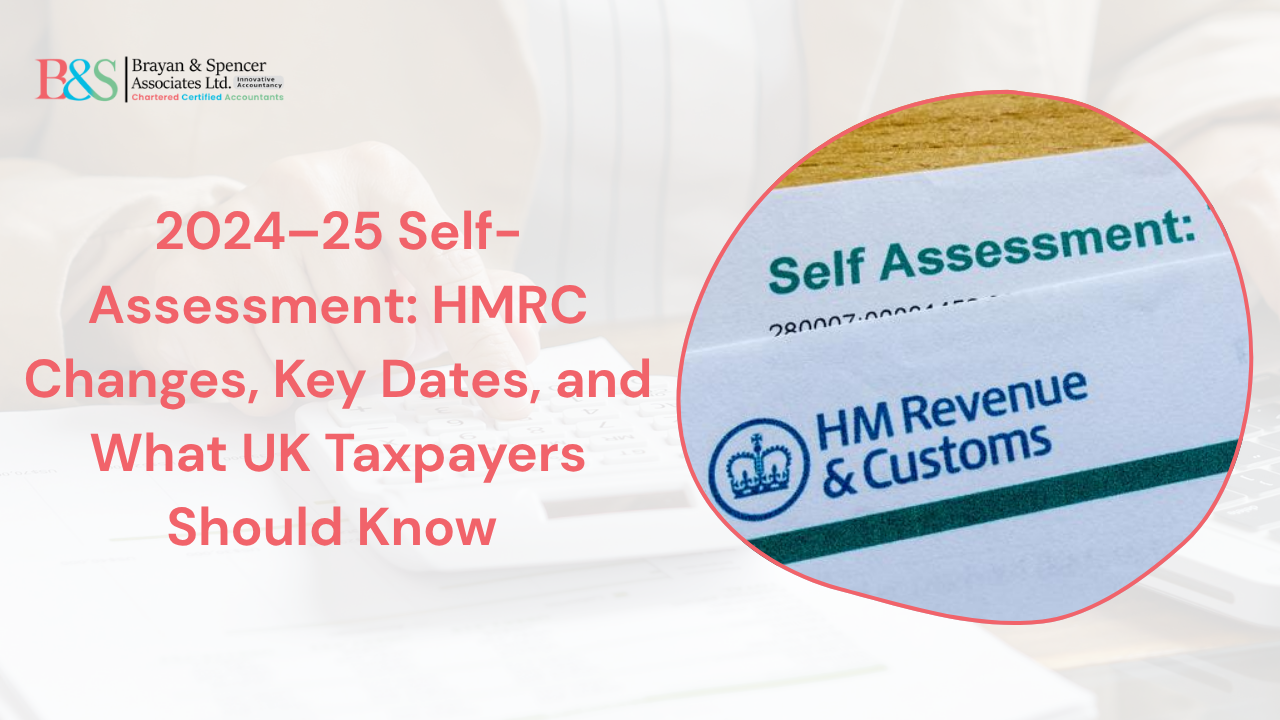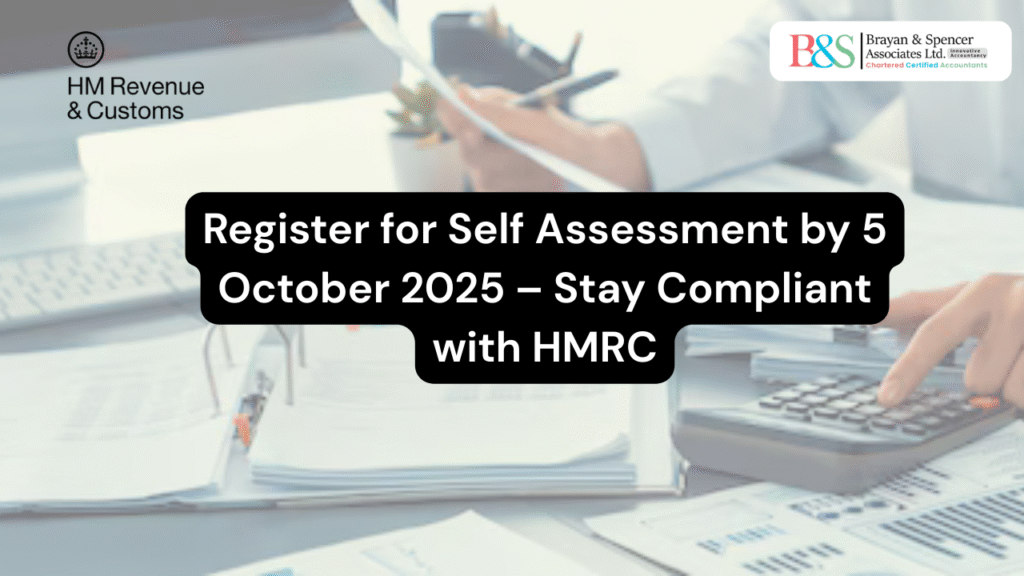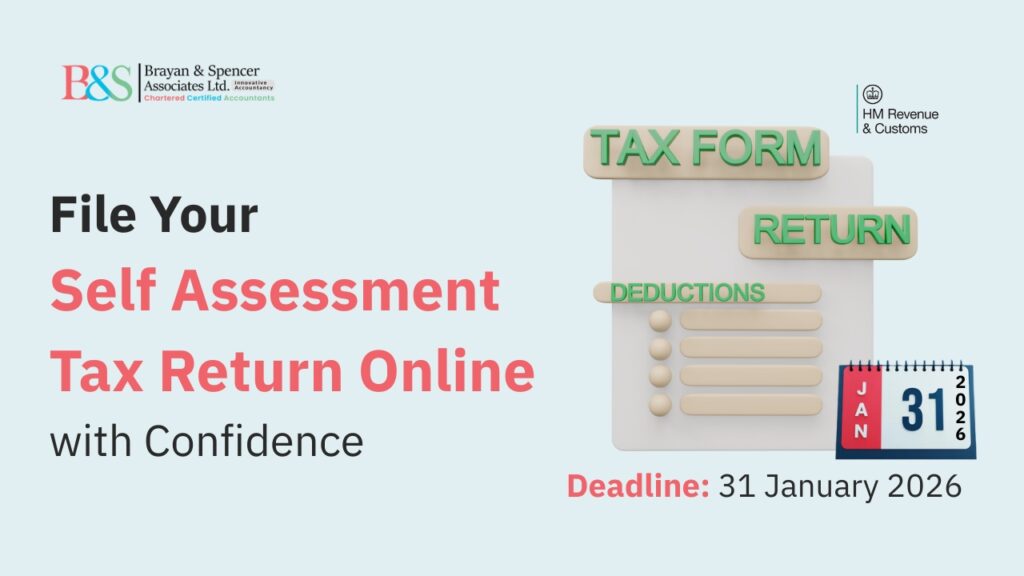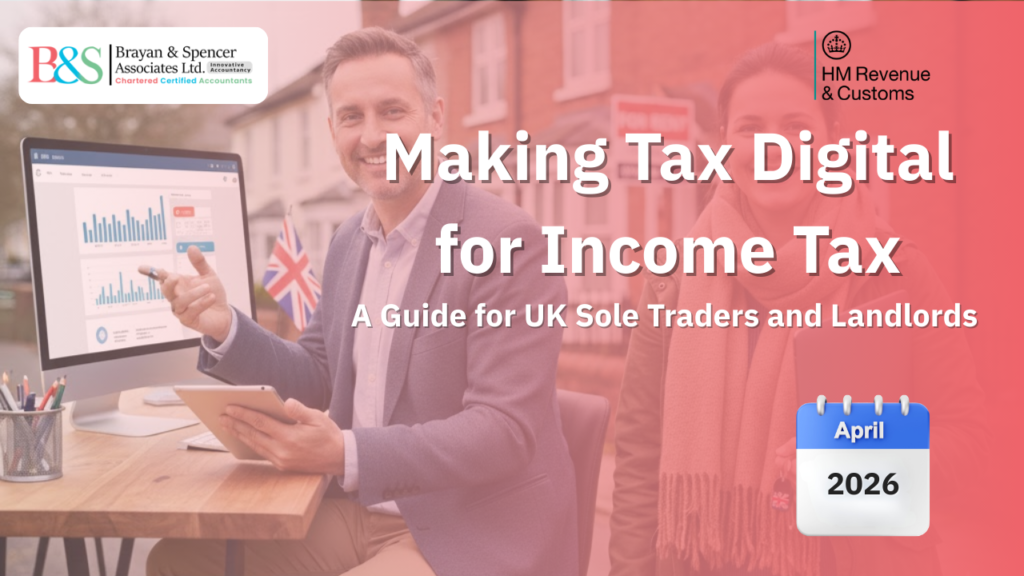For UK taxpayers, the Self-Assessment season can feel overwhelming especially when the rules change or deadlines approach quickly. This guide breaks everything down clearly, with step-by-step guidance to help you confidently file your 2024–25 Self-Assessment tax return online before the deadline of 31 January 2026.
Whether you are self-employed, a landlord, earning through a side hustle, or simply have additional income, this guide is designed to help you file correctly, avoid penalties, and understand exactly what HMRC expects for the 2024–25 tax year.
Understanding the 2024–25 Self-Assessment Requirements
The Self-Assessment system is how HMRC collects income tax from people whose earnings are not fully taxed through PAYE. Londoners with diverse income sources of freelancing, rental property, contracting, gig economy, or investments often fall into this category.
This guide provides:
- Clear Filing Deadlines
- How To Register with HMRC
- Documents To Prepare
- How To Submit Your Return Online
- Penalties To Avoid
Key HMRC Deadlines for the 2024–25 Self-Assessment
Important dates you must know
| Requirement | Deadline | Notes |
| Tax year covered | 6 April 2024 – 5 April 2025 | All income and expenses relate to this period. |
| Register for Self Assessment (new taxpayers) | 5 October 2025 | You must register in time to receive your UTR and set up your HMRC online account. |
| Paper tax returns deadline | 31 October 2025 | Only for those filing via post. |
| Online tax return filing deadline | 31 January 2026 | Final date to file your 2024–25 return and pay your tax bill. |
| Payments on account (if applicable) | 31 January & 31 July | Applies to many self-employed taxpayers. |
Most important:
31 January 2026 is the final date to file your online Self-Assessment tax return and pay any tax due for 2024–25.
Filing early gives you time to budget, correct mistakes, and avoid last-minute HMRC portal delays.
Who Must File a 2024–25 Self-Assessment Tax Return?
You will likely need to file if any of the following apply to the 2024–25 tax year:
- You were self-employed and earned over £1,000 (before expenses).
- You were a partner in a business partnership.
- You earned rental income from property.
- You received dividends, interest, or investment income not fully taxed.
- You earned money from gig economy platforms or side jobs.
- You had capital gains (e.g., sale of property, shares, crypto).
- Your income was over £50,000 and you or your partner received Child Benefit.
- HMRC sent you a notice to file.
If you’re unsure, you can use the HMRC “Check if you need to do a Self Assessment” tool.
Side hustles under £1,000:
If your total income from small gigs is £1,000 or less, the trading allowance may mean you don’t need to file but there are exceptions. If you earn above this, you must register.
How to Register for Self Assessment ?(If You’re New)
If you did not file a tax return last year, you must register with HMRC by 5 October 2025.
Registration steps (simple and clear):
- Create or log into your Government Gateway account.
- Register for Self-Assessment online through your HMRC account.
- HMRC will send your Unique Taxpayer Reference (UTR) by post.
- Use the UTR to activate your Self Assessment online services.
- You can then start completing your 2024–25 tax return.
Tip: Register early UTR letters can take time, especially during peak HMRC periods.
What You Need Before You Start Filing?
Prepare these to avoid mistakes:
- Your Unique Taxpayer Reference (UTR)
- Your National Insurance number
- Income records:
- Self-employment invoices & expenses
- PAYE (P60, P45)
- Pension contributions
- Rental income & expense receipts
- Bank interest and dividend statements
- Proof of benefits or allowances
- Business records if self-employed (bank statements, receipts, mileage logs)
Keeping clear records reduces errors and supports accuracy if HMRC requests evidence.
How to Submit Your 2024–25 Tax Return Online?
Step-by-step filing overview
1. Log in to HMRC
Sign into your HMRC account using your Government Gateway ID.
2. Select the tax year (2024–25)
You can start filing after 6 April 2025.
3. Add relevant income sections
HMRC will guide you to complete the right forms:
- SA100 (main return)
- SA103 (self-employment)
- SA105 (property income)
- SA108 (capital gains)
- And others depending on your income sources
4. Add allowable expenses
This lowers your tax liability, but only genuine, fully supported expenses should be claimed.
5. Review the tax calculation
HMRC automatically estimates your tax bill before submission.
6. Submit your return
Make sure HMRC receives it before 31 January 2026.
Paying Your Tax Bill: What Londoners Should Know
Once your return is submitted, HMRC calculates how much you owe.
Your payment may include:
- Balancing payment (for 2024–25 tax year)
- First payment on account for 2025–26 (if applicable)
Payment methods include:
- Online banking
- Debit card
- Direct Debit
- CHAPS / BACS
- Bank transfer
If you can’t pay
You may be eligible for a Time to Pay arrangement, allowing you to pay in installments. You must submit your tax return first before HMRC sets up a plan.
Penalties and Interest
Avoid these costly penalties:
| Issue | Penalty |
| Late filing (up to 3 months late) | £100 automatic fine |
| After 3 months | Daily penalties may apply |
| After 6 months | Additional penalties based on tax owed |
| Late payment | Interest charged daily |
Always file even if you can’t pay — filing stops further penalties from accumulating.
Common Mistakes Londoners Can Avoid
- Leaving filing until the final week (risking HMRC system delays).
- Forgetting to register by 5 October 2025 if new to Self Assessment.
- Missing deductible expenses due to poor record keeping.
- Forgetting earlier payments on account.
- Typing errors in income or expense figures.
- Not updating address or contact details with HMRC.
The earlier you start, the fewer issues you will face.
A Helpful Note About Professional Support
If you’re seeking reliable, clear guidance to ensure accurate filing whether you’re self-employed, a landlord, or earning from multiple sources Brayan & Spencer Associates provide practical Self-Assessment support tailored to London taxpayers.
They help ensure:
- Correct registration
- Accurate completion of all income sections
- Proper claim of allowable expenses
- Timely submission of your return
- Guidance on payments on account
If you need help understanding your Self-Assessment requirements or want your return reviewed before submission, you can visit www.bsassociate.co.uk or call 0207 183 5956 for straightforward, helpful advice.
FAQs
1. When is the deadline for the 2024–25 Self-Assessment tax return?
The deadline to file online and pay any tax owed is 31 January 2026.
2. When must I register for Self Assessment if I’m new?
You must register with HMRC by 5 October 2025 if you had untaxed income in 2024–25.
3. Do I need to file if I made less than £1,000 from a side hustle?
If your income is £1,000 or below, you may not need to file due to the trading allowance but check HMRC’s “Do I need to file?” tool as exceptions exist.
4. What documents do I need?
You’ll need your UTR, NI number, income records (P60/P45), receipts, bank statements, rental and dividend statements, and any other untaxed income evidence.
5. What happens if I miss the 31 January 2026 deadline?
You’ll receive a £100 automatic penalty, and additional penalties apply the longer you delay. File as soon as possible to prevent further charges.
6. Can I pay my tax bill in instalments?
Yes. If you’ve filed your return, HMRC may allow a Time to Pay arrangement based on your financial circumstances.




